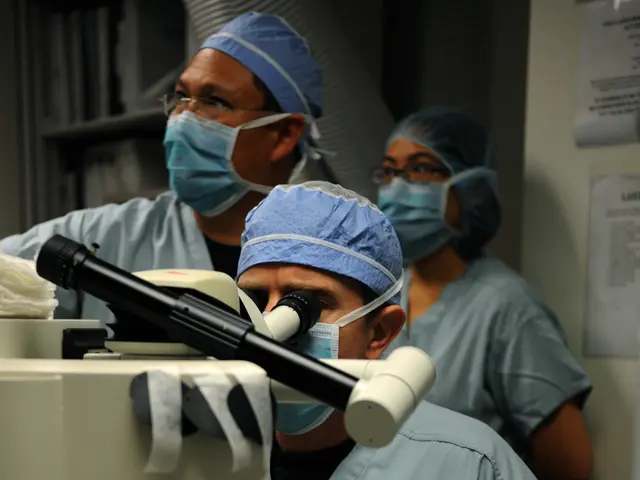"Underground Heroin at Gas Stations: A Widespread, Illicit Phenomenon - The Unvarnished Truth Unveiled"
Heads up! Steer clear of those little bottles sporting vibrant colors you often find at gas stations, convenience stores, and smoke shops. Health officials are sounding the alarm about these products frequently marketed as energy shots or cognitive boosters, but they're actually loaded with an unapproved drug called tianeptine, which can be addictive and carries risks of serious side effects.
U.S. poison control centers have seen a steady surge in tianeptine-related calls for over a decade, and last month, the Food and Drug Administration sent a warning to health professionals about these dangerous products.
The U.S. Tianeptine Market
Tianeptine is approved in some foreign countries as an antidepressant, but it's never been given the green light by the FDA in the U.S. This means it cannot legally be added to foods, beverages, or sold as a dietary supplement. Despite this, shady companies peddle it in various formulas, often under brand names like Zaza, Tianaa, Pegasus, and TD Red. Although selling tianeptine in this manner is technically illegal, the FDA does not preapprove the addition of ingredients to supplements and beverages.
"It's kind of this gray area of consumer products, or supplements, where the contents are not regulated or tested the way they would be with a medication," explains Dr. Diane Calello of the New Jersey Poison Information and Education System.
In 2021, Calello and her colleagues published a study documenting a cluster of emergency calls in New Jersey tied to a flavored elixir called Neptune's Fix. People experienced distress, rapid heartbeat, low blood pressure, and seizures after drinking it. More than a dozen of the 20 patients had to be admitted for intensive care.
So why take it?
Tianeptine products make exaggerated claims - without proof or FDA approval – to treat medical conditions such as addiction, pain, and depression. For instance, in 2018, the FDA issued a warning letter to the maker of a product called Tianna, which claimed to provide "an unparalleled solution to cravings for opiates."
While tianeptine is not an opioid, the drug binds to some of the same receptors in the brain, causing temporary effects similar to oxycodone and other opioids. Tianeptine also carries some of the same physiological risks of opioids, including the potential to dangerously depress breathing.
"That's what tends to get people into trouble," says Dr. Hannah Hays of Nationwide Children's Hospital in Columbus, Ohio. "They use it for opioid-like effects or to self-treat opioid withdrawal, and that can lead to slow breathing and problems like that."
If you're dealing with opioid addiction, pain, depression, anxiety, or other conditions, see a health professional to get a prescription for FDA-approved treatments instead.
On the Rise?
Experts aren’t entirely sure, but national figures suggest a big increase in emergency calls involving tianeptine. Calls to poison control centers skyrocketed by 525% between 2018 and 2023, according to a data analysis published earlier this year. In about 40% of cases, the person had to seek medical care, with more than half needing critical care.
One explanation for the rise in calls is simply more Americans are using the products. But experts also say that the products are becoming more potent and dangerous, leading to more emergencies. And in cases like Neptune's Fix studied in New Jersey, the product was found to contain synthetic cannabis and other drugs.
"You never quite know what's in that bottle,” Calello says. "It's crucial for people to remember that even if they've used a product before, they could end up with something entirely different from what they're expecting."
What can be done?
Tianeptine is not included in the federal Controlled Substances Act, which restricts or bans drugs with no medical use or high potential for abuse, such as heroin, LSD, and PCP. However, about a dozen states have passed laws prohibiting or restricting tianeptine, including Alabama, Georgia, Michigan, Minnesota, Ohio, and Tennessee.
These regulations have yielded mixed results. In some cases, they've led to more cases of withdrawal among users, who can become chemically addicted to tianeptine. But state data also suggest effectiveness in reducing harm tied to the drug.
For example, after Alabama enacted restrictions on tianeptine in 2021, calls began modestly decreasing while calls across other Southern states continued to climb.
*Perrone writes for the Associated Press.*
### Additional Reads:
Exploring the Intersection of Federal and State Laws Governing Controlled Substances in the U.S.
The Role of State-Level Regulation in Shaping Tianeptine Availability
The Hidden Stories of Tianeptine Use in the Southern U.S.
- Despite being approved as an antidepressant in some foreign countries, tianeptine hasn't been approved by the FDA in the U.S., making it illegal to add it to foods, beverages, or sell as a dietary supplement.
- In California, cases of emergency calls involving tianeptine have seen a significant surge, with a 525% increase between 2018 and 2023 according to a data analysis.
- The unregulated tianeptine market is a concern for health professionals, as these products make exaggerated claims to treat medical conditions such as addiction, pain, and depression but lack FDA approval and proof of effectiveness.
- Tianeptine is an ingredient commonly found in energy shots and cognitive boosters, often under brand names like Zaza, Tianaa, Pegasus, and TD Red, but the FDA does not preapprove the addition of ingredients to supplements and beverages.
- Tianeptine, while not an opioid, can bind to some of the same receptors in the brain, causing effects similar to oxycodone and other opioids, potentially leading to dangerous depression of breathing.
- Mental health professionals advise seeking prescription for FDA-approved treatments instead of using dangerous and unregulated tianeptine products for conditions such as opioid addiction, pain, depression, anxiety, or other medical conditions.








